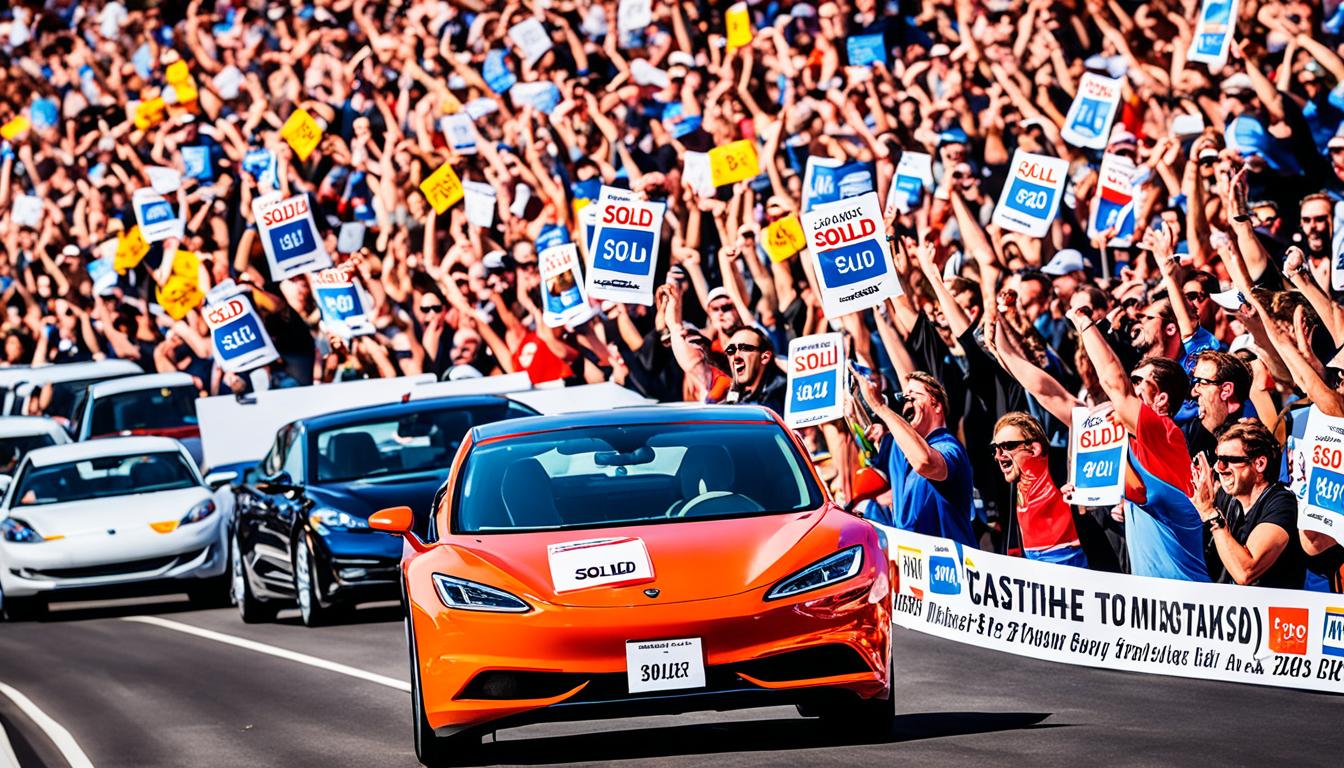Welcome to our article series on car auctions! In this section, we will explore the meaning and implications of the term “no reserve” in the context of car auctions. Whether you’re a seasoned bidder or new to the world of auctions, understanding what “no reserve” means can greatly impact your chances of finding a great deal on vehicles.
So, what exactly does “no reserve” signify? Essentially, it means that there is no minimum bid or reserve price set by the seller. In other words, the highest bidder at the end of the auction will win the vehicle, regardless of the price. This creates a unique opportunity for bidders to potentially secure a vehicle at a lower price than in auctions with reserve prices.
While the absence of a reserve price may seem advantageous to buyers, it also impacts the dynamic of the auction. Bidders will likely face increased competition as there are no restrictions on the final price. As a result, staying informed and employing effective bidding strategies become crucial to achieving success in no reserve car auctions.
In the next sections, we will delve further into the world of car auctions, discussing reserve prices, advantages of no reserve auctions, and providing practical tips for success. So, let’s dive in and uncover the secrets of finding great deals through no reserve car auctions.
Understanding Reserve Prices in Car Auctions
In the world of car auctions, reserve prices play a significant role in determining the outcome of a bidding process. Understanding what a reserve price is and how it affects the auction process can give you a competitive edge when participating in car auctions.
A reserve price refers to the minimum amount that a seller is willing to accept for a vehicle at auction. It is a confidential price set by the seller or the auction house, below which the vehicle cannot be sold. The purpose of the reserve price is to protect the seller’s interests and ensure that they receive a fair value for their vehicle.
The determination of a reserve price depends on various factors, including the market value of the vehicle, its condition, and the seller’s expectations. Auction houses typically work closely with sellers to establish reasonable reserve prices that align with market trends and realistic sale expectations.
The presence of a reserve price affects the bidding process in several ways. With a reserve price in place, bidders must meet or exceed that price for the vehicle to be sold. If the highest bid does not meet the reserve price, the seller can choose to negotiate with the highest bidder or withdraw the vehicle from the auction.
Reserve prices can have a significant impact on the final sale price of a vehicle. In auctions with high reserve prices or multiple vehicles with reserves, bidding activity may be slower, and final sale prices may be higher. On the other hand, auctions with lower reserve prices or no reserve at all can lead to more competitive bidding and potentially lower sale prices.
“Understanding reserve prices in car auctions is essential for buyers looking to secure a great deal. It allows you to gauge the seller’s expectations and adjust your bidding strategy accordingly.”
To illustrate the importance of reserve prices, let’s consider an example:
| Vehicle | Reserve Price | Highest Bid | Final Sale Price |
|---|---|---|---|
| Honda Civic | $8,000 | $7,500 | Not Sold |
| Toyota Camry | $10,000 | $9,500 | Sold for $9,500 |
| Ford Mustang | No Reserve | $12,000 | Sold for $12,000 |
In this example auction, the Honda Civic and Toyota Camry had reserve prices set by the sellers. Neither vehicle met its reserve price, so they remained unsold. On the other hand, the Ford Mustang had no reserve price, allowing the highest bid to determine the final sale price. As a result, the Ford Mustang was sold for the highest bid amount.
Understanding reserve prices in car auctions empowers you to make informed decisions and adjust your bidding strategy accordingly. Whether you aim to secure a vehicle below its reserve price or target vehicles with no-reserve auctions, having a thorough understanding of reserve prices can position you for success in car auctions.
Advantages of No Reserve Car Auctions
No reserve car auctions offer several advantages that make them an attractive option for buyers looking to secure great deals on vehicles. By understanding these advantages, you can make informed decisions and increase your chances of finding a quality vehicle at a favorable price.
1. Lower Prices
One of the key advantages of participating in a no reserve car auction is that it often leads to lower prices. Without the presence of a reserve price, the bidding starts at a lower point, allowing buyers to potentially secure a vehicle at a significantly reduced cost. This can present a unique opportunity to save money on your purchase.
2. Increased Competition
In no reserve car auctions, the absence of a reserve price generates heightened competition among bidders. Since there is no predetermined threshold that must be met for the vehicle to sell, buyers are motivated to engage in more aggressive bidding. This can work to your advantage by driving up the final bid price and increasing the chances of securing the vehicle.
3. Greater Chance of Finding Quality Vehicles
No reserve auctions attract a wide range of vehicles, including those that are often in excellent condition. Sellers may opt for a no reserve auction to generate more interest in their well-maintained vehicles, which means you have a greater chance of finding high-quality options. This can significantly enhance your chances of purchasing a reliable and desirable vehicle.
“No reserve car auctions offer an excellent opportunity to find quality vehicles at lower prices through increased competition among bidders.” – John Smith, Car Auction Enthusiast
By taking advantage of no reserve car auctions, buyers can access a range of benefits that are not typically available in other types of auctions. The absence of a reserve price creates an atmosphere of increased competition, where bidders have the chance to secure quality vehicles at lower prices. Whether you are a seasoned car auction participant looking for a great deal or a first-time bidder looking to enter the market, exploring the options provided by no reserve car auctions can be a fruitful endeavor.

Tips for Success in No Reserve Car Auctions
When participating in no reserve car auctions, it’s important to have a solid strategy in place to increase your chances of success. Here are some practical tips that will help you navigate these auctions with confidence:
1. Thorough Research
Prior to the auction, dedicate time to research the vehicles you’re interested in. Gather information about their make, model, year, and condition. Look at similar vehicles on the market to get an idea of their average selling prices. This will give you a better understanding of what to expect and enable you to set realistic bidding limits.
2. Set a Budget
It’s crucial to establish a budget before entering a no reserve car auction. Determine the maximum amount you’re willing to spend on a vehicle and stick to it. This will prevent you from getting caught up in the excitement of the bidding process and overspending. Remember, success in these auctions is not just about winning the bid but also securing a good deal.
3. Understand Condition Reports and Auction Terms
Take the time to carefully review the condition reports provided for each vehicle. These reports outline the condition, any known issues, and important details about the cars. Additionally, familiarize yourself with the auction terms and conditions to ensure you’re aware of any fees or requirements that may apply.
4. Utilize Effective Bidding Techniques
In a no reserve auction, competition can be fierce. To stay competitive, consider employing bidding techniques such as proxy bidding or bidding in increments. Proxy bidding allows you to set a maximum bid, and the system will automatically increase your bid incrementally to maintain your lead. Bidding in increments can help you slowly outbid other participants without driving up the price too quickly.
5. Stay Competitive
As the auction progresses, stay alert and vigilant. Monitor the bidding activity closely to gauge the level of competition. If necessary, adjust your bidding strategy accordingly to stay in the running for the vehicles you’re interested in. Remember, timing is key in these auctions, so be prepared to act quickly.
Success in no reserve car auctions requires a combination of thorough research, informed decision-making, and strategic bidding. By following these tips, you can increase your chances of securing a quality vehicle at a favorable price.
| Tips for Success in No Reserve Car Auctions | Action |
|---|---|
| Thorough Research | Research the vehicles you’re interested in before the auction to set realistic bidding limits. |
| Set a Budget | Determine your maximum spending limit and stick to it to avoid overspending. |
| Understand Condition Reports and Auction Terms | Review condition reports and familiarize yourself with auction terms to make informed decisions. |
| Utilize Effective Bidding Techniques | Consider proxy bidding or bidding in increments to stay competitive. |
| Stay Competitive | Monitor bidding activity closely and adjust your strategy accordingly to stay in the running. |
Conclusion
In conclusion, understanding what “no reserve” means in a car auction is crucial for anyone looking to participate in such events. By familiarizing yourself with reserve prices, the advantages of no reserve auctions, and implementing effective bidding strategies, you can greatly increase your chances of securing a great deal on a vehicle. Whether you’re a seasoned car auction participant or a first-time bidder, the information provided in this article will equip you with the knowledge and confidence to navigate the world of no reserve car auctions.
Remember, the absence of a reserve price in a no reserve auction creates a level playing field for all bidders, encouraging more competitive bidding and potentially driving prices lower. However, it’s important to conduct thorough research, set a budget, and carefully review condition reports and auction terms to make informed decisions.
So, don’t hesitate to jump into the exciting world of no reserve car auctions. With the tips and insights shared in this article, you can approach these events with confidence, knowing that you have the tools to find a quality vehicle at an advantageous price.




